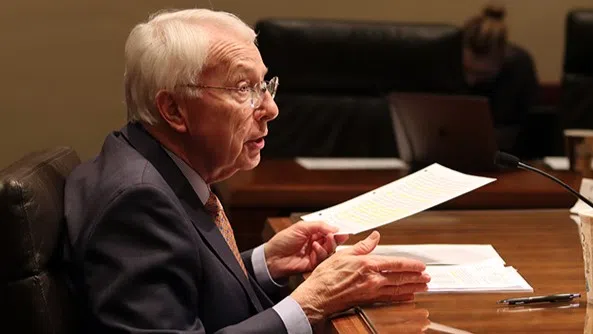
State Senator Merv Riepe (Nebraska Unicameral Information Office)
State lawmakers fielded public opinion on a bill Thursday to allow for exceptions to Nebraska’s 12-week abortion statute when the fetus has a fatal anomaly.
The bill, LB 1109, would provide for a 20-week post-fertilization abortion exception when a terminal condition is diagnosed before the birth of a child that is deemed by two physicians to be “…incompatible with life outside the womb and will result in the death of a preborn child upon birth or inevitably thereafter,” the text reads.
An extended 20-week exception would be congruous with exceptions for incest and sexual assault.
Additionally, LB 1109 would disqualify individuals ‘who intentionally or recklessly performs, or attempts to perform, an abortion in violation of state law’ from criminal penalties. Patients would also face no legal penalties, as you can not be held liable for abortions performed or attempted illegally.
The bill was introduced by former hospital executive and Ralston Senator Merv Riepe, who said before the Judiciary Committee, “I made a mistake by not holding to the amendment I proposed on the floor, during the heated LB626 debate.”
LB 626 would have adopted the Nebraska Heartbeat Act, prohibiting abortion services at roughly 6-weeks gestational age. The bill was ultimately postponed indefinitely, but was later amended to LB574 and expanded to a 12-week statute. Before the bill was shelved, Riepe introduced an amendment to carve out exceptions for fatal fetal anomalies and alleviate criminal penalties.
“These conditions are rare, but when doctors can reasonably ascertain that these conditions exist, it is my belief that mothers should have the option—up to 20-weeks—as to how she, and her doctors, should proceed with the pregnancy,” Riepe told committee members, saying he sees LB1109 as “righting a wrong” on an “incomplete bill.”
“This is a 50 year debate that has divided this nation. We are stuck in the complex place of identifying the balance between the rights of the individual, the rights of the pre-born, and the application of modern medicine,” Riepe offered, “This is not a position that would make the most conservative amongst us happy, or the most liberal among us happy. But its workable, and finds the balance.”
During public comment, committee members juggled a hearing room full of emotional testimony from supporters and opponents. There were 17 opponents who testified, and three proponents. There were 495 written comments submitted online against the bill, 21 online comments in support, and five testifiers plus six written comments were neutral.
Callie Higgins is a mom whose child received a fatal diagnosis, but she decided to still follow through with delivery.
“We knew our time with Archer (their child) was going to be limited, but the hope of even a short time with him was something to hold on to. Archer just barely survived birth itself. Hearing him cry for the first time was something I will remember forever,” Higgins said, opposing the bill, “We got to experience 26 incredibly normal hours with Archer, and he snuggled and made adorable cooing noises in our arms.”
On the other side, mother Tiffany Palmer opted to go forward with an abortion after she received a fatal diagnosis.
“Its not only for mothers who had a one nights stand,” Palmer said through tears, “Its a health care option for those who want a child, but nature gave them the short end of the stick.”
Representatives with Planned Parenthood North Central States testified in the neutral capacity. State Executive Director Andi Curry Grubb said, while appreciating the bill’s intent, ultimately believes these types of decisions should be left between the mother their doctors, and any restrictions should be rejected.
During closing remarks on the bill, Committee member Sen. Rick Holdcroft of Bellevue quibbled with Riepe over the phrase “inevitably thereafter.” Holdcroft argued the phrase is overly broad, and the fact of human mortality that everybody dies “inevitably” after birth. Riepe said the possibly vague phrasing is due to the fact that its difficult to predict with precision how long a fatally diagnosed fetus will live after birth.
No immediate action was taken on LB 1109 by the committee.






